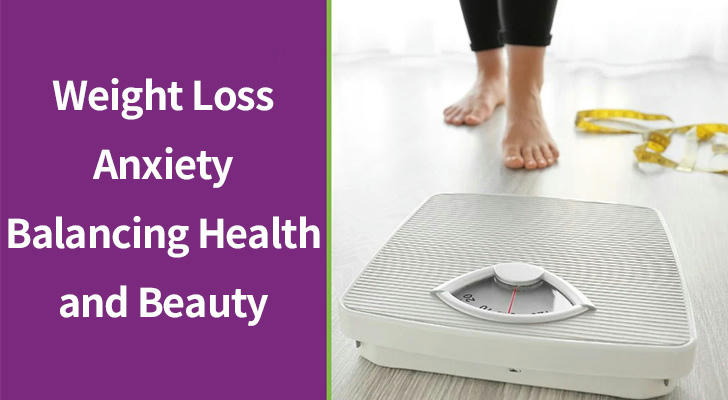Weight Loss Anxiety: Balancing Health and Beauty

In today's image-conscious society, the pressure to conform to unrealistic beauty standards can be overwhelming. Social media platforms are saturated with airbrushed images and heavily filtered content, often promoting an unattainable and often unhealthy ideal of thinness. This constant exposure, coupled with the pervasive influence of diet culture in advertising and popular media, can contribute to a pervasive sense of anxiety and dissatisfaction with one's own body.
The Roots of Weight Loss Anxiety
•Societal Pressure: Societal beauty standards, particularly for women, have historically emphasized thinness as the ultimate goal of physical attractiveness.
•Media Influence: The media plays a powerful role in shaping our perception of beauty, frequently promoting the idea that being thin is the ultimate goal. This relentless bombardment of idealized images can lead to a distorted body image and a constant sense of inadequacy.
•Perfectionism: While striving for excellence is admirable, an excessive pursuit of perfection can lead to unrealistic expectations regarding body image. This can manifest as an obsession with achieving a "perfect" weight or body shape, leading to unhealthy behaviors and significant emotional distress.
•Underlying Psychological Issues: Conditions such as low self-esteem, anxiety, and depression can exacerbate weight loss anxiety. Individuals struggling with these issues may be more susceptible to negative body image and may engage in unhealthy weight loss behaviors as a means of coping.
The Harmful Consequences of Weight Loss Anxiety
•Eating Disorders: Extreme dieting, often driven by weight loss anxiety, can lead to the development of serious eating disorders such as anorexia nervosa, bulimia nervosa, and binge-eating disorder. These disorders can have devastating consequences for both physical and mental health.
•Physical Health Issues: Chronic dieting and restrictive eating patterns can lead to nutrient deficiencies, weakened immune systems, hormonal imbalances, and other serious health problems.
•Mental Health Issues: Weight loss anxiety can significantly impact mental health, contributing to depression, anxiety, low self-esteem, and even social isolation.
A Healthier Approach to Weight Management
A healthier and more sustainable approach to weight management focuses on overall well-being rather than solely on weight loss. This involves:
•Balanced Diet: Prioritize whole, unprocessed foods, including fruits, vegetables, lean proteins, and whole grains.

Practical Tip: Experiment with new recipes, try cooking at home more often, and focus on creating meals that are both nutritious and enjoyable. For example, try incorporating a new vegetable into your meals each week, or plan a weekly cooking session to prepare healthy and delicious meals in advance.
•Regular Physical Activity: Engage in regular physical activity that you enjoy, such as running, swimming, dancing, or team sports.
Practical Tip: Find an exercise buddy to stay motivated, explore different activities to find what you enjoy, and set realistic fitness goals. For example, start with short walks and gradually increase the duration and intensity of your workouts. Aim for at least 150 minutes of moderate-intensity aerobic activity per week, as recommended by the World Health Organization.
•Adequate Sleep: Prioritize quality sleep, as insufficient sleep can disrupt hormones that regulate appetite and metabolism.
Practical Tip: Establish a regular sleep schedule, create a relaxing bedtime routine (such as a warm bath and reading), and optimize your sleep environment by ensuring a dark, quiet, and cool room.
•Stress Management: Practice stress-reduction techniques such as meditation, yoga, or deep breathing exercises to manage stress levels and improve overall well-being.

Practical Tip: Download a meditation app like Headspace or Calm, join a yoga class, or spend time in nature to reduce stress and promote relaxation.
For example: Spending 15-20 minutes in nature each day has been shown to reduce stress levels and improve mood.
•Body Positivity: Cultivate a positive body image by focusing on self-acceptance, appreciating your body's unique strengths, and challenging negative thoughts about your appearance.

Practical Tip: Practice self-compassion by acknowledging and accepting your imperfections. Focus on your body's capabilities rather than its appearance. Surround yourself with positive influences and limit exposure to media that promotes unrealistic beauty standards.
Embracing Body Diversity
It's crucial to remember that beauty comes in all shapes and sizes. There is no one "ideal" body type, and everyone's body is unique and deserving of respect.
•Celebrate Diversity: Embrace and celebrate the diversity of human bodies.
•Focus on Health, Not Weight: Shift the focus from weight loss to overall health and well-being.
•Challenge Societal Norms: Actively challenge unrealistic beauty standards and promote body positivity in your own life and within your community.
Seeking Professional Help
If weight loss anxiety is significantly impacting your life, consider seeking help from a qualified mental health professional. A therapist can provide guidance and support as you work towards a healthier relationship with your body and develop coping mechanisms for dealing with weight loss anxiety.
Conclusion
Weight loss anxiety is a complex issue with significant social and psychological implications. By understanding the underlying causes, adopting a holistic approach to health and well-being, and embracing body positivity, we can break free from the cycle of diet culture and cultivate a healthier relationship with ourselves and our bodies. Remember, true beauty comes from within, and it's essential to prioritize overall health and happiness.
